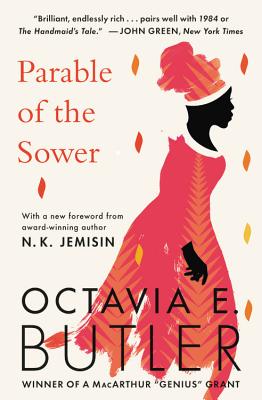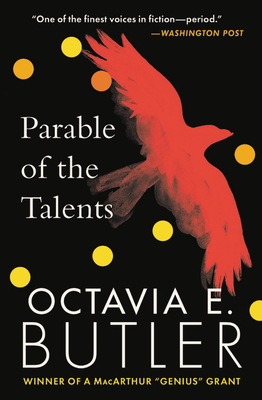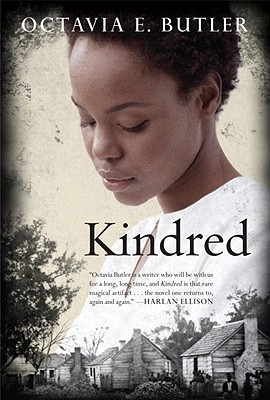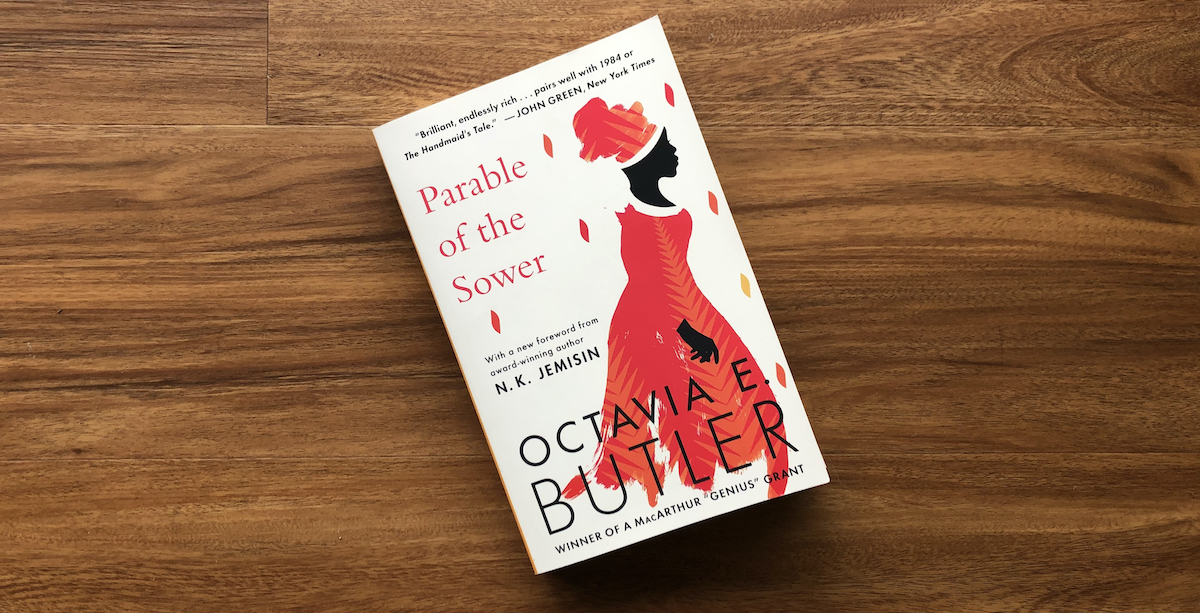Stories for Earth relies on contributions from our listeners and readers to produce high quality, in-depth content. If you buy something using the links on our website, we may earn a small commission, at no extra cost to you. For more information, see our Affiliate Disclosure.
Regarded by many as the definitive cli-fi novel, Parable of the Sower by Octavia Butler imagines what our future could look like if we don’t take swift and appropriate action to mitigate climate change.
Never miss an episode
Subscribe wherever you enjoy podcasts:
Overview

Parable of the Sower by Octavia E. Butler (buy on Bookshop from $15.63) is a groundbreaking speculative fiction novel that tells the story of young Lauren Olamina as she journeys to Northern California to escape ecological and societal collapse in Southern California. Today, the book is heralded as one of the first major works of climate fiction or cli-fi. After Lauren’s town is destroyed by an outlaw group of drug addicts, she must learn to survive in a world reeling from the devastating effects of climate change. Along the way, Lauren starts a religion called Earthseed, forms a ragtag band of followers, and makes plans to found her own sustainable community in Northern California.
→ Buy USED on Better World Books from $11.75 (affiliate)
→ Buy NEW on Bookshop from $15.62 (affiliate)
→ Find at your local library
Table of contents
- Transcript
- Who was Octavia Butler?
- Plot summary of Parable of the Sower
- Themes in Parable of the Sower
- Recommendations
Transcript
I’m Forrest Brown, a writer and lover of stories, and you’re listening to Stories for Earth.
Welcome to Stories for Earth, a podcast about stories that can give us strength and resiliency in fighting the climate crisis. This is our first ever episode. I’m so glad that you’re out there listening, whoever and wherever you are.
Today, we’re already experiencing the effects of our climate’s destruction. And now that we are past the point of completely averting the climate crisis, I think we should be turning our attention to how we can emotionally prepare ourselves for the challenges and hardships that are coming our way.
We should, of course, also work on reversing the damage we’re doing to our environment, but we can’t ignore the emotional and psychological aspect of this work, either.
I personally have been depressed, anxious, and hopeless about our situation, and I know others, perhaps even you, feel or have felt this way too. This is something called “climate grief,” and it’s a very real thing.
I’ve been doing some research on this, and I think we aren’t talking about it enough. In the book Emotional Resiliency in the Era of Climate Change by psychologist Leslie Davenport, the author notes that suicide and depression rates skyrocket after natural disasters, disasters that will become more intense and common as the climate crisis worsens.
Has this info helped you?
Stories for Earth is and always will be a free resource to help people imagine brighter futures through the material we discuss. It’s also created and paid for by one person! Apart from occasional affiliate revenue, donations from people like you is the only way Stories for Earth remains financially feasible.
I’ve heard the Swedish activist Greta Thunberg talk about getting extremely depressed when learning about the climate crisis. In fact, a lot of activists and scientists who work in this field often suffer from a sort of “pre-traumatic stress disorder,” a condition in which a moderate level of stress and dread about the future gradually wears them down.
As more and more everyday people such as myself become more aware of this crisis, they, too, will suffer from such conditions.
So what does all this have to do with stories? I think quite a lot, actually. Stories are the lens through which we see the world. We use stories to translate chaos into sense and meaning. I am a reader and a writer, not a psychologist or any other kind of licensed health professional, but think stories can help us here, like they do in so many other parts of life, and many academics and doctors agree.
A German environmental and cultural sociologist named Annika Arnold wrote a book called Climate Change and Storytelling that focuses on how stories and various narratives can help us fight the climate crisis.
In the introduction, Annika says, “As story-telling animals, we perceive facts, numbers, and urgent appeals that surround climate change inherently as a story.” She goes on to say, “…in order to make the fight against climate change a priority, climate advocates need to tell stories, to mobilize people and guide their actions.”
So, that’s exactly what I hope this podcast will be—a place where we can talk about stories that can help to mobilize us and guide our actions and thinking. We’ll focus a little less on the specific actions part and more on the thinking, emotional part.
We’ll talk about stories from authors who also grappled with issues like the climate crisis, natural disaster, persecution and hardship, rapid change, and more. These won’t just come from books—I think any kind of story told through any kind of medium can be powerful, so we’ll also look at movies, TV shows, video games, and who knows what else.
So, now that you hopefully have a firmer understanding of what this podcast is all about and we’ve finished our sort of “first day of school” syllabus reading and personal introductions, let’s get on to the story for our first episode: Parable of the Sower by Octavia E. Butler.
Who was Octavia Butler?
I was first introduced to Octavia E. Butler as a freshman in college when her book, Kindred, was assigned as reading for an introductory class I took. I didn’t appreciate her at the time, but since then I’ve become a big fan of hers, especially after reading her near-future dystopian novel Parable of the Sower.
Octavia Butler was born Octavia Estelle Butler in Pasadena, California on June 22, 1947. She was an only child, and she grew up poor. Despite this, she went on to earn an associate of arts degree from Pasadena Community College and then she studied at Cal State in Los Angeles before going on to UCLA.
After college, she attended the Clarion Science Fiction Writer’s Workshop, which is a prestigious training ground for many aspiring science fiction and fantasy writers. Butler started writing as a young child, around the age of eight or 10 years old, and she went on to win the Hugo Award, a Nebula Award, and a MacArthur Foundation Fellowship, which, on the Charlie Rose Show, she refused to call a MacArthur “Genius Grant,” saying that if they really did hand those awards out to geniuses, she surely would not have won the award.
After her death, she was also awarded the PEN American Center Lifetime Achievement Award in writing. Today, we remember her as the first black female science fiction writer to rise to prominence. Octavia said of herself—this was a quote that she wrote, I found it inside of the front cover of Parable of the Sower—she said, “Who am I? I am a 37-year-old writer who can remember being a 10-year-old writer, and who expects someday to be an 80-year-old writer. I’m comfortably asocial, a hermit, a pessimist if I’m not careful, a feminist, a black, a former Baptist, an oil-and-water combination of ambition, laziness, insecurity, certainty, and drive.”
Unfortunately, Octavia Butler died a few years ago outside of her home near Seattle, Washington of a stroke at the age of 58.
Plot summary of “Parable of the Sower”
WARNING: spoilers ahead
So on the surface, Parable of the Sower is a book about the collapse of the United States. But really, it’s a book about climate change. And while that is a huge part of the story, it’s almost just kind of lurking in the background. I would say more than anything, the book is really about what humans are able to accomplish when they set their sights on something greater than themselves.
The book is set in the near future—the near future at the time of the book’s publishing. To us, not so far away now. It’s set in the mid-2020s in a dystopian world that’s been wrecked by climate change.
In this world, the US Federal Government has lost much of its control, state borders are closed off the same way national borders are today, and gangs of dangerous drug dealers rape and pillage towns and communities across the countryside, the hunger, desperate, and homeless steal and kill to survive, and a gang of people addicted to a drug called Pyro—which is a hallucinogen that drastically enhances a user’s high when looking at fire—attack communities to steal money for drugs before burning everything to the ground.
Our heroine is Lauren Olamina, a black girl growing up in Robledo, California, which is a walled community outside of Los Angeles. Though, walled for necessity, not because they were wealthy. Lauren is the daughter of a Baptist preacher and a college professor, and she keeps a journal which constitutes the book. In this journal, she describes her life experience and also a religion she says she discovered which she called Earthseed.
Another really interesting thing about Lauren is that she was born with a birth defect called hyperempathy. This was caused by an intelligence-enhancing drug her mom was taking during pregnancy. Hyperempathy forces her to share in the feelings of others, the good and the bad, though as you might imagine in the world Lauren is growing up in, it’s mostly just a lot of bad feelings.
We’ll talk more about Earthseed, Lauren’s religion, in just a moment, but for now, there are two main takeaways you need to know about the religion. These are the two main tenets of Earthseed:
- God is change
- The destiny of humanity is to take root among the stars
The story of Parable of the Sower is really the story as recorded by Lauren Olamina. Every entry begins with a verse of Earthseed before jumping into accounts of Lauren’s experience of living in a world that’s reeling from the devastating effects of climate change. These effects include:
- Massive wealth inequality
- Homelessness
- Lack of water
- Decreased access to education
- Epidemics of drug addiction
- Refugee crises
- A rise of far-right nationalist politics and Christian fundamentalist extremism
We’ll talk more about that in our second episode on the sequel to this book, which is called Parable of the Talents.
Also read: “Parable of the Talents” by Octavia E. Butler
So Lauren grows up in a walled community in Robledo, California, when one day her community is destroyed by Pyro addicts. They manage to break down the gate and basically just attack her community and burn it to the ground.
Lauren manages to escape, along with two other survivors from her community, and together they start walking north. Lauren has it in her mind that she wants to go to either Washington State or Canada, where she’s heard that things are supposed to be better.
Along the way, the three of them run into other travelers who join their party, including a former physician from San Diego named Bankhole, who winds up taking them to a large plot of land he owns in a safer part of Northern California. Lauren’s journal chronicles their perilous journey to Bankhole’s land, where they settle and establish the first community of Earthseed.
Themes in “Parable of the Sower”
There’s a lot going on in this book, and reading it at the time of this recording seems kind of surreal, to be honest. It’s incredibly eery how prophetic this book is in so many different ways.
A good example—the book talks about rampant crony capitalism with giant tech firms who bring back slavery via indentured servitude pretty much. There’s also a rise of racism, hate crimes, and nationalism.
There are massive refugee crises of people being driven not only from Central America and Mexico to the United States, but also of people being driven from the United States up to Canada and to Alaska, which, spoiler alert, as we’ll see in the next book, actually becomes its own sovereign state. Alaska secedes from the Union for the first time since the Civil War.
Last but not least, there’s obviously unmitigated climate change, which Butler does an incredible job of portraying as an intersectional issue, especially considering this book was published in 1993—26 years ago at the time of this recording in 2019.
There’s a really great quote from the book that sums this all up. Lauren writes, “People have changed the climate of the world. Now they’re waiting for the old days to come back.”
So climate breakdown is a central issue in the book that basically sends the world back to the Dark Ages, the Middle Ages. And I think that the way Butler chose to grapple with this issue as an intersectional one is brilliant. There are four main ways in which I think she does this.
1. Lauren’s hyperempathy
At first when I was reading through this book, I thought hyperempathy would be a purely net-positive. Surely, in such a violent time, when there’s so much uncertainty and massive social upheaval, being able to empathize on a crazy level with other people would surely be a good thing, it would really instill some kind of kindness or maybe help the world try to put itself back together.
But I hadn’t considered how it could also be a crippling thing and even dangerous at times. Especially when Lauren is having to defend herself and her party from Pyro addicts or thieves or what have you. For example, if she shoots someone and she sees it happen, she feels the gunshot wound. As you can imagine, that’s debilitating.
But overall, Octavia Butler uses hyperempathy to save Lauren and her party for the very reason that I first described: it forces Lauren to see other people as human beings with feelings that are just as important as her own. This causes her to be compassionate towards other people, and in a world that’s devolved even further into every man for himself, this helps Lauren to find strength in numbers to grow her party by basically taking in people from the road.
So, hyperempathy may be fictional, but it does force us to consider how we would treat other people if we always felt everything they’re feeling. So as more people become victims of natural disaster and the emotional-psychological effects of climate change, I think we can benefit a good deal from thinking about Lauren’s hyperempathy and applying that to our own lives of how we can empathize more with others and then turn that empathy into compassion.
2. Resiliency and embracing change
Earthseed, which is the set of essential truths Lauren believes she’s discovered, repeatedly emphasizes one thing: God is change. Change is the only constant, it’s an unstoppable force, as far as Lauren is concerned.
You really only have two responses to this. You can either choose to be terrified and paralyzed or you can be nostalgic and long for “the good old days” and try to fight against change, go back to the way things were before. But, as Lauren notes, this is only going to see you barreled over by change.
So instead of resisting change, people should learn to accept it and bend with it to sort of go with the flow. And in this way, the best human response to change is resiliency. This is something we see in nature all the time—there’s greater strength in pliability than in rigidity. I think this applies really well to what we’re talking about here.
We hear the word “change” in “climate change” all the time, but I’m not convinced we always stop to consider all the ways in which a changing climate forces us to change as well. We may have to change the way we vote, the way we consume products, we that we get around—our transportation—and also how we transport and store goods.
I’m not saying it’s going to be easy to make these changes. For the characters in the book, the changes they have to make certainly aren’t easy. I don’t think it’s going to be easy for us, either. But we’re much better off for adapting to our changing world than digging in our heels and fighting a battle that we’re sure to lose.
3. Taking action as opposed to staying complacent
Here’s a quote from a verse of Earthseed:
All that you touch, you change
All that you change, changes you
The only lasting truth is change
God is change.
So what Lauren is saying here is, as we’re changed, we also affect change. I think this is illustrated best through an example, a thought experiment.
So if you think about water that’s coming from a melting glacier, it runs down the rocks over the centuries, it’s going to dig rivers and streams. But the way that the land gives to that water determines the path that the water will eventually take. Which in turn influences a lot of things. It forges the climate, geography, and leads way to entire ecosystems.
So the best response to a change as colossal as climate change, then, is taking action. Climate change is going to make huge changes to the way we live, just like I mentioned, but we’re not powerless to this. Every action we take also creates change, all of which adds up.
Also read: “Ishmael” by Daniel Quinn, Climate Change, and Moving Beyond a Vision of Doom
I think I struggled with this a little bit because when reading about the book, Octavia Butler said that Earthseed was a kind of culmination of a lot of religions she studied to write the book, some of which include Buddhism, Taoism, and other Eastern religions. And I think a lot of Western readers, when they’re first introduced to these religions, mistake resiliency for complacency or for just being passive or like a pushover or something like that.
But really, that’s not what it’s saying. I think the way that Octavia Butler addresses this is really good. She takes special care to emphasize these traditions that are often lost of us Western readers, especially parts about action, or lack thereof. She sums this up in a verse from Earthseed:
Why is the universe?
To shape God.
Why is God?
To shape the universe.
So, this isn’t necessarily saying to dig in your heels and resist change like we were saying, but in going with change, we can also make a different set of decisions in that situation that will, in turn, impact the change we’re going through.
The verse I just read is acknowledged as the central paradox of Earthseed, and it’s the opposite of being complacent, weak, submissive, and demure. Instead, it centers on being strong-willed, on taking action, on riding the wave of change but also directing it as you’re able to in order to suit your desires.
For Lauren, this meant seeking a better life and always being prepared, but for us today it could be any number of things. Just like we talked about: voting for elected officials with plans for fighting climate change, making responsible consumer choices, planting trees, and protesting inaction from our governments and corporations peacefully.
4. Strength in numbers
Climate change is the biggest threat facing humanity today, and it’s going to take as many people as possible to stop it and reverse it. This means people in every sector, every industry—we all have an invaluable role to play in reversing climate change.
This includes people who work in energy production, the arts, people who work in business, agriculture, and construction. If this book does nothing else, I think it demonstrates that everything is delicately and inextricably intertwined, and that even the most seemingly insignificant changes have palpable effects that extend across the entire world.
I remember I was listening to a really good podcast about climate change recently called Climate One, and a guy who was a climate writer for Vox was on the show. And I remember, he said something I thought was really good. He said people will often come to him and say, “Climate change is this massive, huge issue, and I am only one person. What can I possibly do to fight climate change that will make any meaningful difference?”
And he had a really good response. He said something along the lines of, “Think about how big climate change is then think about how many of us there are.” That just means that whatever you do is going to make a difference because everyone is needed.
You don’t have to be a scientist to do something about this. We need people in the arts, we need people who work in agriculture, and various other sectors of our society for us to be able to stop this thing, for us to be able to pull it off. I think that’s really what Octavia Butler was trying to get at in Parable of the Sower.
Recommendations

Book: Parable of the Talents by Octavia E. Butler
→ Buy NEW on Better World Books from $15.27 (affiliate)
→ Buy NEW on Bookshop from $15.63 (affiliate)
→ Find at your local library

Book: Kindred by Octavia E. Butler
→ Buy NEW hardcover on Better World Books from $23.00 (affiliate)
→ Buy NEW on Bookshop from $14.72 (affiliate)
→ Find at your local library

